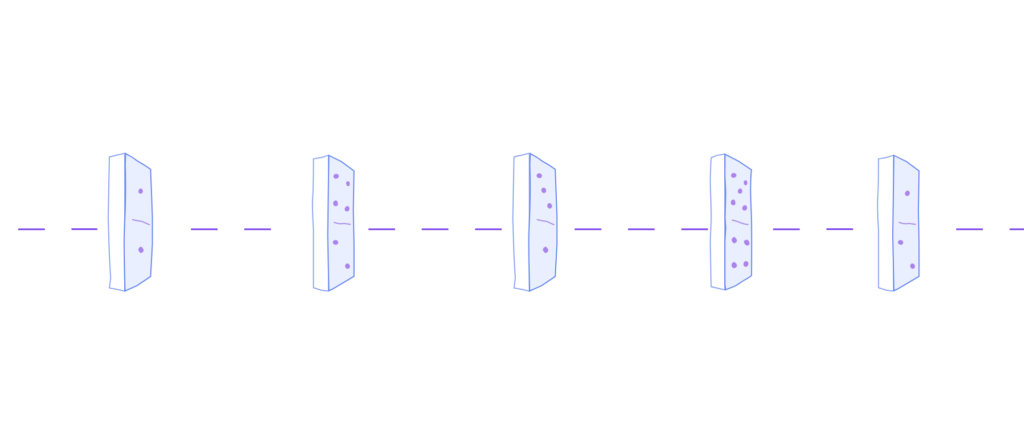Blockchain is already shaping the future of many industries (for the better) and is set to be the next big technology to ring sweeping changes through sectors and the gambling industry is one of them.
Compared to the pre-mobile days of exclusively physical, in-person gaming and gambling, nowadays online-player numbers around the world have soared, fueled hugely by advancing technologies.
Yet even still, technological barriers exist within the gambling sector that holds back progress. Trust and transparency remain a significant issue for some players, and for operators, the gaming experience is reliant on often centralized systems, that are themselves vulnerable to manipulation and hacking.
This is where blockchain comes in!
The advantages of blockchain and smart contracts can solve many issues regarding safety and fair game, as the technology allows to record anonymously user actions and game results; Faster transaction speed, because clients of blockchain-based resources can withdraw or deposit funds without waiting for several days; Anonymity, as blockchain-based crypto casinos guarantee that player personal information won’t be disseminated and more…
But why does gambling need blockchain, and what are the advantages of the technology?
What benefits could blockchain offer the gambling industry?
Blockchain technology offers a number of unique advantages over other systems that make it such a perfect fit for gambling:
Transparency
Firstly, there’s the transparency angle. In blockchain systems, data is written automatically to a distributed ledger, which by definition provides an immutable, trusted source of truth. Blockchain gaming data can be relied upon by operators, players, and regulators, all of whom can access the same data in real-time which is helpful for resolving player trust issues and the disputes that inevitably arise along the way. But it’s also incredibly useful for operators meeting their compliance requirements.
Security
One of the main opportunities blockchain provides is enhanced security. With data held on the blockchain theoretically unhackable and totally secure, information can, automatically, be considered no longer vulnerable to fraud. The decentralized nature of the technology ensures secure transactions as well as prevents data from being changed or deleted. So the history of victories and payments is not only open but also well-protected and immutable.
Improved Payout Process
As for payments, the process of withdrawal has always been a challenge. In order to get the money, one could face the necessity to deal with different documents and intermediaries as well as time delays.
Blockchain technology introduces smart contracts to the gambling industry. These are programs that perform certain actions (eg. money transfer) when the required conditions are met.
Furthermore, blockchain technology allows faster transaction speed as payments are conducted directly, without third parties and there is no need for clients to wait several days to withdraw their money.
So, empowered by blockchain, the process of getting money becomes fast, cheap and simple.
Cryptocurrency Availability
In the public mind, blockchain has always been known for cryptocurrencies and in the case of gambling, it is an appropriate association. Implementation of crypto in the betting and gambling services can widen the audience and helps to get rid of third-party intermediaries like banks or payment services.
Audience Expansion
People related to the industry believe that blockchain will help to make gambling more socially acceptable and, as a result, attract more users to blockchain-based betting platforms and casinos. This is the effect of the benefits we mentioned above: security, cryptocurrency availability, and others.

What challenges does the gambling industry face with blockchain?
Unfortunately, things like anonymity can be regarded as a two-edged sword. For example, the fact that transactions can’t be traced to the real user, if no KYC is required, opens the door to the very same criminal activity the industry is trying to prevent nowadays. While blockchain services are hailed for anonymity, this feature isn’t likely to sit well with regulations. How would anonymous gambling allow for effective age checks, anti-money laundering processes, and self-exclusion facilities? These questions are fair to ask and are not something the technology is not capable of solving – for example via Zero-Knowledge Proof based systems, which would allow the user to prove they are old enough to participate in the betting platform without revealing sensitive and/or private information to the whole world.
Many people consider the investment in bitcoin as the same as gambling in a casino. However, while gambling on games like roulette often requires an understanding of roulette odds and strategy play successfully, a similarly considered approach to investing in cryptocurrency might be futile. This is due to its sheer volatility, which can drastically drop its value in a single day. The challenge – price volatility. All cryptocurrencies, with no exceptions, are prone to price change. The value of a single unit of currency changes on a day-to-day basis exactly because the blockchain is ungoverned and decentralized. This creates a feeling of insecurity in many users and casino players, thus making them reluctant to even get started with the technology.
The very nature of the technology allows players to improve the fairness and transparency of online gambling. However, the regulatory issues involved in introducing blockchain could prove to be the biggest stumbling block companies face.
That said, some places are already starting to adopt laws that allow casinos and gambling operators to accept cryptocurrencies as legal tender.
The Gambling Commission has already accepted that cryptocurrencies can be used for gambling. This is because it’s classed as ‘money or money’s worth’ in the Gambling Act 2005. But it has expressed concerns about how well casinos will be able to put effective controls in place that manage the various risks involved with these cryptocurrencies.
If these regulatory challenges can be overcome, it’s highly likely we’ll witness blockchain being more regularly adopted to audit, monitor, and record different parts – from the players and operators to the games themselves.
Conclusion:
Despite the potential challenges and controversies involved, blockchain is an emerging technology that cannot be ignored, particularly in technology-based businesses like online casinos. Over the next ten years or so, experts predict that blockchain will transform almost every industry – including gambling, as blockchain allows gambling to rapidly advance and enter new levels of trust-based customer relations and guarantees fair gaming, which is quite important for the industry.
So stay tuned!



